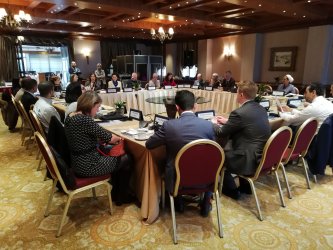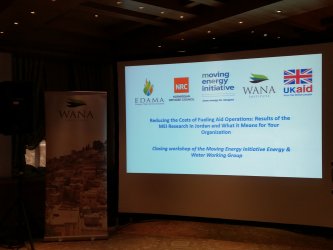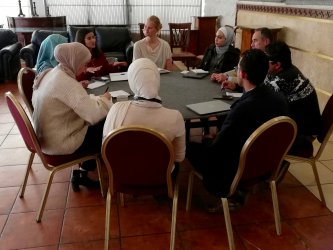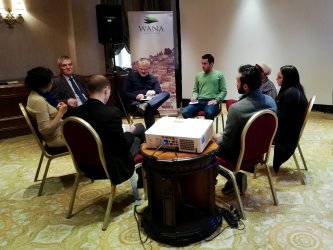-
Reducing the Costs of Aid Operations through Cleaner Energy
Reducing the Costs of Aid Operations through Cleaner Energy
The Working Group on Energy and Water of the Moving Energy Initiative held its closing workshop on 13 March in Amman. Over the past two years, the Working Group has brought together government, humanitarian, NGO, and business actors in Jordan in support of the energy priorities of the Jordan Response Plan for the Syria Crisis.
The West Asia-North Africa (WANA) Institute organised the workshop in partnership with Chatham House-The Royal Institute for International Affairs, EDAMA, and the Norwegian Refugee Council. It was attended by government experts, representatives from humanitarian agencies, and local and international NGOs, who were welcomed by Shereen Shaheen, Director of Programme at the WANA Institute.
The meeting aimed to help humanitarian organisations reduce their environmental footprint, lower their energy costs, and play a positive role in Jordan’s sustainable energy transition. Greening humanitarian operations will become increasingly important given the implications of the Paris Agreement and the focus of international aid and finance on supporting climate resilience in refugee hosting countries. Government participants also highlighted ways in which humanitarian agencies could contribute to and benefit from Jordan’s Green Growth Plan.
Glada Lahn from Chatham House noted that “often, humanitarian aid projects are faced with short-term budgets and emergency mind-sets, meaning that energy costs are not prioritised. Diesel is the go-to fuel with already established supply lines in emergencies. However, according to our recent report on the costs of fuelling humanitarian aid, agencies worldwide could save at least USD517 million yearly in fuel costs by switching to cleaner energy practices through technologies that are already available now.”
The solar plants at the refugee camps of Zaatari and Azraq in Jordan are a prime example of renewable energy in aid operations, now saving the agency USD7 million each year. A recent UNHCR report details the impacts these investments have had on the protection, health, education, economic inclusion, and livelihoods of the camp residents, in addition to the environmental and financial operational benefits.
The workshop identified transport and office buildings efficiency as two key areas for humanitarians to improve their energy impact in Jordan. Participants discussed the need to buy less polluting fuel and pool transport fleets to cut fuel costs and emissions. Some mentioned the dangerous levels of diesel pollution — fuel produced in Jordan has a sulphur content of between 9000 and 13000 parts per million (ppm) compared to the European standard of 10ppm, which has grave consequences for human health. Many were enthusiastic about the potential for increasing electric vehicle use with solar power if costs can be reduced. Participants also shared ideas for generating savings through retrofitting existing office buildings or choosing to rent efficient ones.




